Flames of Rebellion Read online
Page 7
As much as it galled him to accept the governor’s censorship, it was more important to keep scrutiny off his activities. At least until the day Haven was truly free.
“All right,” he said, staring up into the uncertain faces looking back at him. “Do what you can, all of you.” He turned toward his personal assistant. “Suze, get me the governor’s office. I’ll see what I can do.”
“Yes, sir.” His assistant nodded and turned to leave the room. The others stood there, looking uncertain about what to do.
“Go,” Danforth said, gesturing with his hands for them to leave. “Earn your salaries. Get as close to the mine as the feds will let you. Question everybody you can find. Maybe somebody will let something slip, and we’ll get an idea of what’s really going on.” Danforth tried his best to sound like a dedicated journalist, and to an extent he was, though his only real interest was exposing anything that could embarrass and discredit Federal America and weaken its hold on Haven.
“Go!” he roared again when his people moved too slowly for his taste. “The one who gets me something here keeps his job.” He watched them all quickly file out, and then he put his head down in his hands. The headache was bad, but it was more than that. Something was happening, more than just a riot at the mine complex. There had been disturbances before, but none this large . . . and none that had gone on for so long.
Half the federal security troops on Haven are out there . . . and they won’t let anybody near. But they haven’t ended it yet, which makes no sense. There might be a lot of prisoners, but it isn’t like they could actually win, not fighting against assault rifles with sticks and stones.
What the hell is going on?
The door opened again. He looked up slowly, pulling his face from his hands to see Suze walk back in. She’d been Danforth’s aide for years, and the two worked seamlessly together. Sometimes he swore she could read his mind. But he still wished she’d learn how to knock before barging in.
“What is it, Suze?”
“The governor’s office says no one is available to discuss the situation at this time, but they will respond as soon as possible.”
“That’s bullshit.” Danforth shook his head. Everett Wells wasn’t exactly an easy source of information, but he was usually available to Danforth on the phone, at least to repeat the official bullshit with added authority.
What the hell is going on?
“Something else, Suze?” He noticed she was still standing inside the door, hovering.
“Yes, sir . . .” She took a few steps inside and lowered her voice. “Mr. Haggerty is here.”
Danforth nodded. “Oh . . . very well. Show him in.” He looked around the room, more by habit than anything else. His office was private; he made sure of that by having it swept for surveillance devices twice a day. Still, he didn’t like meeting Haggerty at his office, but he didn’t have any choice—he was short of time.
“Mr. Danforth?” The man standing by the door was massive, tall and broad shouldered. He had long stringy hair hanging down well past his shoulders, brown once but now mostly gray. He looked more like a drifter or some kind of wilderness explorer than someone who would be meeting the head of the planet’s top communications concern. But he had his own special abilities, and right now Danforth needed those.
“Yes, Zach, thanks for coming on such short notice.” A pause. “Can you help me out on this one?”
The man had a troubled expression on his face. “That is a lot of platinum, Mr. Danforth. You need it immediately?”
“Immediately, Zach. It’s very important.” He suspected Haggerty knew what he was doing with the precious metal, and he’d never have worked with the black marketeer if he hadn’t been certain of the man’s rebel sympathies. Still, the fewer people who knew—or even suspected—that Danforth was stockpiling weapons, the better.
Haggerty took a deep breath and exhaled hard. “For anyone else, I’d say no way . . . but for you, I will try. It will be riskier than usual, though. Secrecy is my trade, you know. But if I am going to round up that much so quickly, I’ll have to take more chances than I usually do.
“Which means I’ll have to double my commission.”
Danforth expected that. He got up and walked around his desk. “Thank you, Zach. I wouldn’t ask you to work so quickly if it wasn’t important. And double the usual fee . . . agreed.”
Danforth had considered canceling the whole operation, but he needed more guns. Sasha Nerov’s price was exorbitant, but she was also the most reliable of the smugglers he’d worked with, and one of the few willing to challenge the growing federal blockade. He suspected, too, that somewhere under her hard, mercenary exterior, she was a true rebel sympathizer. Most of the other gunrunners were profiteers and had already quit, scared off by the rumors that a smuggler’s vessel had been intercepted and the crew murdered by the federal authorities.
Nerov had the guts to go, though, and the skill as a pilot to make it past the blockade. But sympathies or no, she still expected to get paid. And that meant two hundred kilos of platinum. By tomorrow night.
“Okay, Mr. Danforth. If I’m going to get your two hundred kilos by tomorrow, I’d better get started.”
Danforth walked up and shook Haggerty’s hand. “Again, Zach, you have my profound gratitude.”
“I will contact you by midday tomorrow with a meeting place for delivery—only you, Mr. Danforth, as usual.”
“I will come alone, Zach. Just let me know where and when.”
“I’m sorry, Captain Nerov, but all ore deliveries are on hold pending a resolution of the disturbance at the mine.” The port manager was calm and professional, but there wasn’t a hint of sympathy for Nerov’s situation.
“No,” Nerov said, staring at the man behind the desk. “That won’t do. I have a schedule to keep, a very important one. We cannot be delayed here.” She was tense, anxious to get her ship ready to launch. Waiting around could only increase the risk.
And the rebels need those guns . . .
She hadn’t admitted to herself how much she cared about the revolutionaries, clinging stubbornly to her belief that she was motivated by profit only. But deep down, even she realized that was bullshit. She couldn’t help but respect men like John Danforth, born into privilege but willing to risk it all for a chance at freedom. As a smuggler, used to making her own rules, she didn’t even try to kid herself that she could live the censored and regulation-choked existence of Federal America’s citizens Earthside.
Especially not surrounded by petty bureaucrats like this asshole.
“I am sorry, Captain, but there is nothing I can do. We were already short on inventory before the disturbance, and I’m afraid the warehouse is empty. Even if the governor ordered it, we couldn’t provide you with ore. Not until the mine resumes operation.”
Sasha wanted to argue, to insist again that she couldn’t wait. But she realized it was pointless . . . and as much as she didn’t want to remain in port longer than necessary, drawing too much attention to herself would be worse.
Sasha knew her business. There wasn’t a weapon left in Vagabond’s hold, not so much as a single bullet or cartridge. She’d wiped her ship’s security logs, replacing the days of records with carefully prepared fakes, images that showed machine parts in her hold and not crate after crate of military-grade ordnance. But it was still unhealthy for a smuggler to hang around too long in port. Vagabond could pass as a freighter, but anyone taking a hard look at her ship’s systems would see she was massively overpowered for a standard cargo hauler. And the weapons suite would be another warning sign—not outright illegal, but enough to draw scrutiny if anyone paid sufficient attention to notice. So while there was no proof of her smuggling activities, and even less that she’d been running guns, she was experienced enough to know proof wasn’t really necessary, not in Federal America. Not if the suspicion was strong enough.
Think . . .
“I expect to receive a priority allocation as soon as
the standoff at the mine is over,” she said. “This delay is enormously costly, and my ship must be loaded and ready to launch as quickly as possible.”
“I will do all I can to accommodate yours needs, Captain Nerov. I’m sure you are aware yours isn’t the only freighter waiting for cargo.” The noncommittal tone of the port manager was morphing into one of mild annoyance at her insistence.
Something about the way he said “freighter” set alarm bells ringing in her head.
Did he just pause when he said freighter? Is he suspicious?
Or was it just his way of pushing her back, of putting an end to her complaining with veiled threats of scrutiny no captain would want, not even a legitimate freight carrier? There wasn’t the port manager ever made who couldn’t find enough violations to ground any ship. Was that it? Or was it something else, more dangerous?
Whatever it was, she had to back off . . . and hope for the best.
“Thank you for your efforts,” she said, trying to sound as pleasant as the anger and stress dueling inside her allowed. She turned and walked away, through the hallway of the port office and out into the midafternoon sun. She tried to put the concerns out of her mind, but she couldn’t help but worry that she’d pushed things too hard. She prided herself on being rational and careful . . . but taking her frustration out on a bureaucrat who could drop a shitstorm on her with a few words to a superior didn’t qualify as either.
She pulled the small comm unit from her pocket and glanced at the clock display. It was almost time to go meet Danforth and Jacen and collect her first payment for the voyage. She wasn’t sure what to do. Should she take it now, even though she had no idea when she’d be able to leave? Or should she just return to Earth without any cargo?
No, that won’t work. No legitimate freighter could pay the bills carrying loads one way.
She couldn’t think of a better way of screaming “smuggler” than arriving in home port with no cargo.
She walked down the street, back to her lodging. She just had time to change her clothes and get to the rendezvous point. Although she wasn’t sure if it even made sense to take the payment now, considering she couldn’t leave. Not to mention if she did take the money, she didn’t know where she’d hide it. Putting it on the ship, especially now, was out of the question. But she had no way to reach Danforth to postpone the meeting, not without raising even more suspicion. A freighter captain barging into Danforth’s office would draw as much attention as arriving back on Earth with an empty hold.
She shook her head.
Dammit.
CHAPTER 6
ALACOMARA MINE
FEDERAL PRISON CAMP TWO
FEDERAL COLONY ALPHA-2 (HAVEN)
EPSILON ERIDANI II
“We still have no idea how the prisoners got the weapons, Governor, but we’ve managed to activate portions of the surveillance system, and we’ve confirmed they are indeed heavily armed.” Thornton paused, her eyes fixed on the live feed from the mine displayed on her tablet. “This is going to be a lot messier than we thought. It’s going to cost, sir, no matter what we do. But I don’t see any alternative. It will take weeks to starve them out. Someone outside is obviously helping the prisoners, and that’s an unknown that will cast a shadow over everything we do, wondering what will happen next. Especially if we wait.”
“You sound like a woman who has a plan, Alexandra. So why don’t you just let me know what it is?”
Apparently Thornton had awakened the governor. She felt a twinge of guilt. Wells probably hadn’t slept more than a few hours in the past three days, and she’d managed to zero in on one of the few times he’d dozed off. It didn’t occur to her that she hadn’t slept at all during those three days herself, but that was her military training showing again. She was in battle—of a sort at least—and there would be time for sleep later. In the meanwhile her adrenaline—and the half dozen stims she’d popped over the last two days—would have to keep her going.
And then maybe we can all get some sleep.
But if that was going to happen, she’d have to end this riot. And as Wells had guessed, she thought she knew how to do it. “Yes, Governor. I request permission to storm the facility. I’d like to go in just before dawn. The prisoners will be the least alert and prepared then. In addition, we still have limited control over the internal systems, enough to cut off some of their power and lighting.”
“How bad will it be?” She tended to doubt most politicians cared much about the butcher’s bill, but Wells was different than most of his kind, and she believed his concern was sincere.
Unfortunately, she had no idea what to tell him. There was just too much she couldn’t know, too many uncertainties hanging over the operation.
“I don’t know, Governor,” was her honest answer. The fact was, she’d spent a lot of her own time pondering this very subject, and that was the best she’d been able to come up with. “I’d expect at least a dozen casualties . . . and probably two or three times that.” A pause. “Perhaps even more. Those mines aren’t exactly the easiest target to attack, and our surveillance is incomplete at best.”
“And the prisoners?”
“It will be bad, sir. If they surrender immediately, most of them will survive. If they fight . . .”
“Yes, Major? If they fight?”
“Then we could be looking at close to 100 percent casualties, Governor. I can’t send my people in there with half-assed rules of engagement. If they go in, it’s got to be with orders to target all armed militants . . . and shoot to kill.”
After a moment of silence, Wells said, “Very well, Major. You are authorized to proceed at your own discretion.” Wells didn’t sound happy, but there was a firmness to his voice nevertheless. “Just make sure your people only shoot armed rioters. We have no idea if all the prisoners are involved or just a group.”
“That may be difficult, Governor. My troops could end up in an intense firefight. Once they start taking losses—”
“When they start taking losses they will realize they are professional soldiers, and they will act as such. They are authorized to defend themselves, to use deadly force against any and all armed threats. But if they start blowing away unarmed personnel who are not resisting, I promise you they will face charges. Understood?”
“Yes, sir. Understood.” Do you understand, though? It was easy for the governor to sit behind a desk and talk about a battle in a theoretical sense. But for a solder on the front line, dodging incoming fire and watching friends die? It was easy to say spare unarmed personnel before the shooting starts, a lot harder to enforce it, especially when a “noncombatant” could pull a hidden weapon out at any time and kill the soldier who’d held his fire.
Wells added, “I know this will be hard on your people, Alex, and I’m counting on you to keep control of the situation. Just do your best to take anyone who surrenders prisoner. We don’t need to feed the rebels’ stories about soldiers shooting down miners with their hands up.” There was a short silence, then: “There is no one I trust more.”
“Yes, Governor,” she responded, surprised once again at Wells’s insight. Sure, the governor had never been a soldier, but he was the kind of politician a warrior could honorably serve.
“Good luck, Alex. And take care of yourself.” The genuine concern was obvious in his voice.
“I will, sir. Thornton out.”
That went quick.
She’d expected to have a fight on her hands to convince him. But the more she thought about it, the better she understood. There was no other choice, not even for a man like the governor, who tried to avoid violence whenever possible. This situation was dangerous, and more so for the unanswered questions, specifically the one concerning the unidentified source of support for the rioters. If her people somehow allowed armed prisoners to slip by them, to escape, the civilian toll could be disastrous.
No, they couldn’t wait. And she knew Everett Wells realized it as much as she did.
Jamie c
limbed down the ladder, focusing on each step and keeping his grip as he grabbed one rung after another. He was exhausted, his eyes heavy like lead as he fought to keep them open. He’d found enough water, and even some food—though sitting out for three days did nothing to improve the already half-rancid prison rations. Still, they provided nutrients, and it was amazing what starvation could do to make anything seem like a delicacy. Even reconstituted beans.
Sleep was the real problem. For more than three days he had struggled to stay awake. He’d been mostly alone on the twentieth level, but he still didn’t dare take the chance of shutting his eyes for a second. Yes, he’d been in the mine for a long time, and he had a reputation, one that had generally discouraged anyone from taking him on directly. And when a couple groups had come down to the level, mostly scavenging for food and water, he’d been able to face off against them and stand his ground, and they’d left him alone, no more than a few insults hurled his way. But he didn’t doubt one of the rioters, worked up and on edge as they were now, would have slit his throat if he’d been asleep.
It was definitely starting to take a toll.
He’d stayed within a few meters of his assigned workspace, but now he was heading down, to the lowest levels of the mine. He had to find a place to get some rest, and he figured the bottom was the best bet. The twenty-second level was still being excavated, mostly by robot-controlled machines. There would be no food, water, hand tools—nothing that would draw any of the other prisoners down there. And that made it a good place to hide for a while. To sleep.

 The Emperor's Fist
The Emperor's Fist Blood on the Stars Collection 1
Blood on the Stars Collection 1 Attack Plan Alpha (Blood on the Stars Book 16)
Attack Plan Alpha (Blood on the Stars Book 16) BOB's Bar (Tales From The Multiverse Book 2)
BOB's Bar (Tales From The Multiverse Book 2) The Others
The Others Nightfall
Nightfall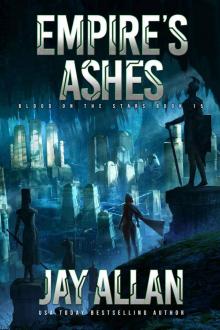 Empire's Ashes (Blood on the Stars Book 15)
Empire's Ashes (Blood on the Stars Book 15) Wings of Pegasus
Wings of Pegasus Crusade of Vengeance
Crusade of Vengeance The Last Stand
The Last Stand Blackhawk: Far Stars Legends I
Blackhawk: Far Stars Legends I Call to Arms: Blood on the Stars II
Call to Arms: Blood on the Stars II Cauldron of Fire (Blood on the Stars Book 5)
Cauldron of Fire (Blood on the Stars Book 5) Revenge of the Ancients: Crimson Worlds Refugees III
Revenge of the Ancients: Crimson Worlds Refugees III Crimson Worlds Successors: The Complete Trilogy
Crimson Worlds Successors: The Complete Trilogy The Grand Alliance
The Grand Alliance Portal Wars 1: Gehenna Dawn
Portal Wars 1: Gehenna Dawn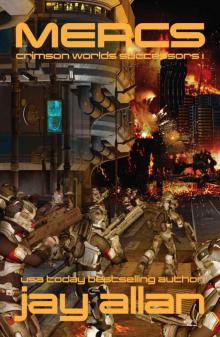 MERCS: Crimson Worlds Successors
MERCS: Crimson Worlds Successors Crimson Worlds: 08 - Even Legends Die
Crimson Worlds: 08 - Even Legends Die Winds of Vengeance
Winds of Vengeance Invasion (Blood on the Stars Book 9)
Invasion (Blood on the Stars Book 9) A Little Rebellion (Crimson Worlds III)
A Little Rebellion (Crimson Worlds III)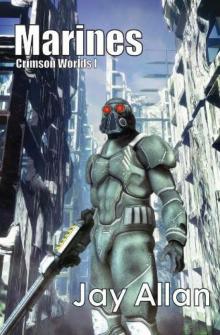 Marines
Marines Black Dawn (Blood on the Stars Book 8)
Black Dawn (Blood on the Stars Book 8) Shadow of Empire
Shadow of Empire Galactic Frontiers: A Collection of Space Opera and Military Science Fiction Stories
Galactic Frontiers: A Collection of Space Opera and Military Science Fiction Stories Winds of Vengeance (Crimson Worlds Refugees Book 4)
Winds of Vengeance (Crimson Worlds Refugees Book 4) Dauntless (Blood on the Stars Book 6)
Dauntless (Blood on the Stars Book 6) Portal Wars: The Trilogy
Portal Wars: The Trilogy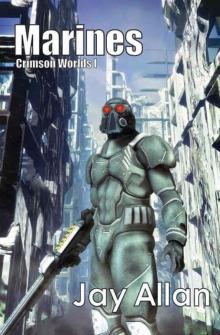 Marines cw-1
Marines cw-1 The Cost of Victory
The Cost of Victory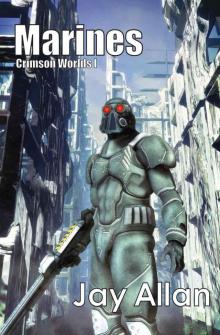 Marines (Crimson Worlds)
Marines (Crimson Worlds)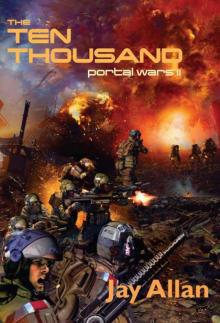 The Ten Thousand: Portal Wars II
The Ten Thousand: Portal Wars II The White Fleet (Blood on the Stars Book 7)
The White Fleet (Blood on the Stars Book 7) Crimson Worlds Collection III
Crimson Worlds Collection III The Black Flag (Crimson Worlds Successors Book 3)
The Black Flag (Crimson Worlds Successors Book 3) Tombstone
Tombstone Gehenna Dawn
Gehenna Dawn A Little Rebellion (Crimson Worlds)
A Little Rebellion (Crimson Worlds) Ruins of Empire: Blood on the Stars III
Ruins of Empire: Blood on the Stars III Dauntless
Dauntless Shadows of the Gods: Crimson Worlds Refugees II
Shadows of the Gods: Crimson Worlds Refugees II The Dragon's Banner
The Dragon's Banner Echoes of Glory (Blood on the Stars Book 4)
Echoes of Glory (Blood on the Stars Book 4)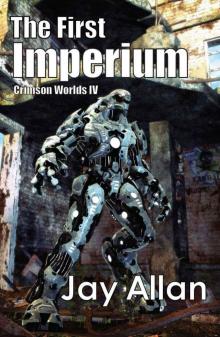 Crimson Worlds: 04 - The First Imperium
Crimson Worlds: 04 - The First Imperium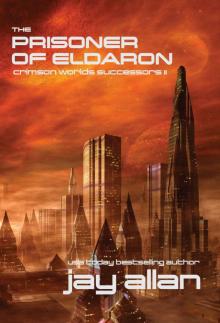 The Prisoner of Eldaron: Crimson Worlds Successors II
The Prisoner of Eldaron: Crimson Worlds Successors II The Cost of Victory (Crimson Worlds)
The Cost of Victory (Crimson Worlds) Duel in the Dark: Blood on the Stars I
Duel in the Dark: Blood on the Stars I Into the Darkness: Crimson Worlds Refugees I
Into the Darkness: Crimson Worlds Refugees I Crimson Worlds Refugees: The First Trilogy
Crimson Worlds Refugees: The First Trilogy The Cost of Victory cw-2
The Cost of Victory cw-2 Stars & Empire 2: 10 More Galactic Tales (Stars & Empire Box Set Collection)
Stars & Empire 2: 10 More Galactic Tales (Stars & Empire Box Set Collection) Flames of Rebellion
Flames of Rebellion Stars & Empire: 10 Galactic Tales
Stars & Empire: 10 Galactic Tales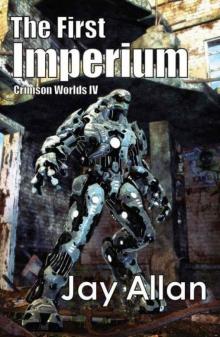 The First Imperium cw-4
The First Imperium cw-4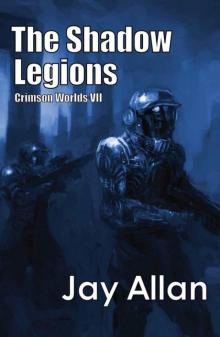 Crimson Worlds: 07 - The Shadow Legions
Crimson Worlds: 07 - The Shadow Legions Storm of Vengeance
Storm of Vengeance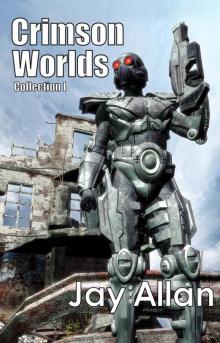 Crimson Worlds Collection I
Crimson Worlds Collection I Rebellion's Fury
Rebellion's Fury Homefront: Portal Wars III
Homefront: Portal Wars III Tombstone (crimson worlds)
Tombstone (crimson worlds) Crimson Worlds: Prequel - Bitter Glory
Crimson Worlds: Prequel - Bitter Glory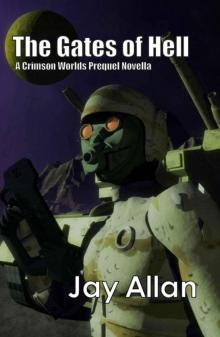 Crimson Worlds: Prequel - The Gates of Hell
Crimson Worlds: Prequel - The Gates of Hell The Fall: Crimson Worlds IX
The Fall: Crimson Worlds IX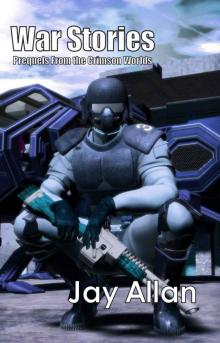 Crimson Worlds: War Stories: 3 Crimson Worlds Prequel Novellas
Crimson Worlds: War Stories: 3 Crimson Worlds Prequel Novellas Enemy in the Dark
Enemy in the Dark Crimson Worlds Collection II
Crimson Worlds Collection II